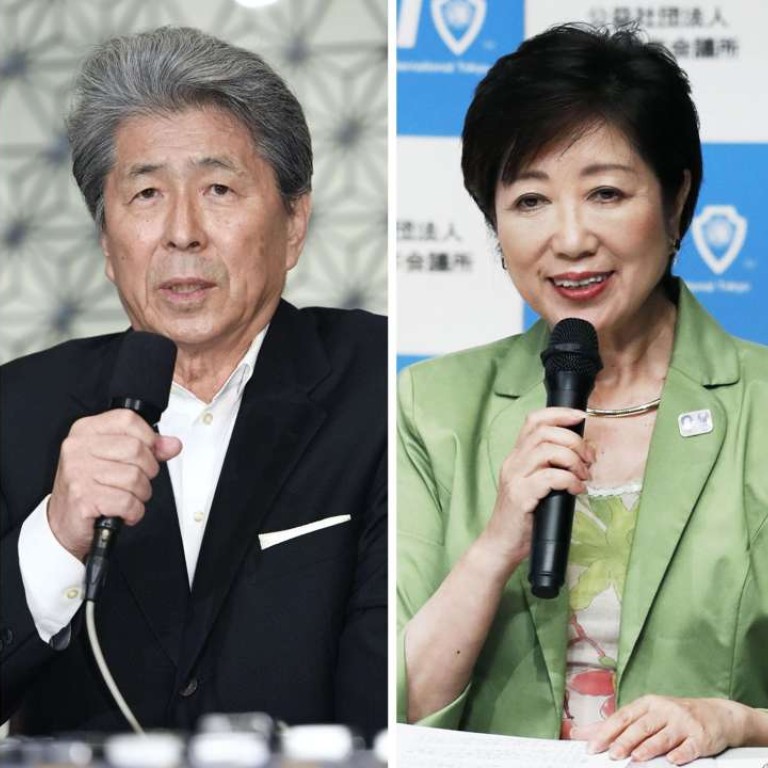
Tokyo to try new governor on path to 2020 Olympics in July 31 vote
Major task facing the new chief administrator is managing the run-up to the troubled Olympics
Tokyo votes on Sunday for a new governor who will have to get gaffe-plagued preparations for the 2020 Olympics back on track and avoid spending scandals that forced the last two incumbents to quit.
The major task facing the new chief administrator of the sprawling metropolis of 13.6 million – who will be elected Sunday for a four-year term – is managing the run-up to the troubled Olympics.
Leading candidates are all promising to run a clean ship, skillfully helm an economy the size of Indonesia’s, tackle dire childcare shortages and prepare for a possible major earthquake that could hit Japan’s capital anytime.
But their handling of the Olympics is key, with Tokyo’s next leader facing swelling costs for sport’s marquee event, possibly double or triple the reported original forecast of 730 billion yen (US$6.92 billion).
“The Olympics and its budget will be a major challenge,” said Muneyuki Shindo, an emeritus political science professor at Chiba University.
The 2020 Games have already been marred by a series of embarrassments, the latest being the resignation as governor of Yoichi Masuzoe, who quit over spending public money on lavish hotels and spa trips.

His abrupt resignation wrong-footed the political class, Shindo said, and the current field of candidates is subpar as a result.
“The race itself is taking place in such a short period of time, and I don’t think major parties were able to give thorough consideration to the fielding of their candidates.”
The Tokyo election regularly draws a diverse range of candidates from serious policy wonks to colourful, kooky eccentrics.
This year’s field includes perennial participant and Smile Party leader Mac Akasaka, who has campaigned for prior elections dressed in a cosplay Superman costume.
Typically two or three serious front runners quickly dominate media coverage – and this time is no exception.

Local media surveys say it is a three-way race between former defence chief Yuriko Koike, ex-Iwate prefecture governor Hiroya Masuda and veteran TV journalist Shuntaro Torigoe.
Koike, a 64-year-old former TV anchorwoman, speaks fluent English and Arabic – the latter acquired as a student in Cairo – and has also served as environment minister.
She was once seen as having the best chance to be Japan’s first female prime minister, but was defeated when running for the post in 2008.
She has compared herself to Hillary Clinton.
“Hillary used the phrase ‘glass ceiling’. It’s often a sheet of steel in Japan,” Koike once told a television talk show.
Masuda, also 64 and backed by Abe’s ruling coalition – which spurned Koike for not seeking its approval before announcing her candidacy – is a veteran administrator who won plaudits as governor of northeastern Iwate for 12 years until 2007.
Also in the running, is 76-year-old Torigoe, a liberal journalist widely known in Japan for his ubiquitous TV appearances and also as a cancer survivor.
Masuzoe was the second governor to resign since Tokyo was named as host of the Games.
His predecessor Naoki Inose – who had led the successful bid in 2013 – bowed out later that year after becoming embroiled in a personal finance scandal.
Last year, Japanese Prime Minister Shinzo Abe had to tear up blueprints for a new Olympic stadium because of ballooning costs, while organisers ditched the official logo after the designer was accused of plagiarism. A new one was solicited.
Those fiascos, however, have since been overshadowed by allegations of corruption, and French prosecutors have launched an investigation into alleged bribes linked to Tokyo’s bid. Organisers have denied wrongdoing.

.png?itok=arIb17P0)